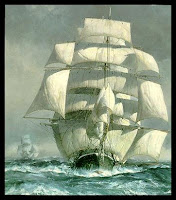
I'm beginning to sense a pattern here.
Reds (directed by Warren Beatty) is about communism. Sort of. Reds is the true story of the radical revolutionary journalist Jack Reed (Warren Beatty), who is a jerk, and his wife Louise Bryant (Diane Keaton), who get swept up in the events of the Russian revolution, and attempt to bring the revolutionary spirit to the United States. It's epic and romantic and historic commentary, but mostly it is long. And kind of boring. Not bad, though, it's definitely a very well-made movie. It's just very, very long and uneventful.
Like The Ten Commandments, Reds is split into two parts. The first half is mostly about Jack and Louise's budding romantic relationship, an the second half is mostly about how they've gotten caught up in Bolshevism and Communism and the Russian revolution, and how this affects there lives. There's no Intermission music though, which is lame. The second half is far more interesting than the first. A whole lot of nothing happens in part 1, but part 2 is very eventful. People go to Russia, people get thrown in jail, it's very excited. They more to the seaside in part 1.
In the first half of the movie, Louise has an affair with Eugene O'Neill, the playwright (Whose son-in-law, by the way, was Charlie Chaplin, who was a knight. You can't question knighthood.) Eugene O'Neill is played by Jack Nicholson. Do you know who's creepier than Jack Nicholson? Nobody. Nobody is creepier than Jack Nicholson.

Nobody.
I wonder if Eugene O'Neill was really that sinister in really life, or if that's just Jack Nicholoson. There was a point in the movie when he was angry at Louise, an I literally thought Eugene O'Neill was going to kill her.Stephen Sondheim, the great writer of musicals, actually did the score for this movie. I didn't actually notice the music most of the time, but there was this one song that's heavily featured in the first half of the movie, and comes to symbolize the relationship of Jack and Louise. As the movie goes on and they start movie away from this relationship, we hear this song less and less. The point in the movie where they finally get back to each other is when we hear the song again, and it's a really strong point in the movie. It's my favorite part, actually.
Do you know what there are a lot of in this movie? Montages. There is an incredibly large amount of montages in this movie. I swear there is a montage for every single major event in these people's lives. When we're not watching a montage, we're watching a series of very short, incomplete scenes, which I know sounds like a montage but isn't. A montage has music over it. This movie is made up almost entirely of scenes lasting no more than a minute or two, and montages. It's very bizarre, and I can't figure out if it's good film-making or not. Since it's the American Film Institutes's #9 epic, I'm going to assume it is, but the way this movie moves is still vaguely unsettling.
The part of the movie that isn't montages is mostly made up of people who really lived through the events of the movie, "Witnesses," summing up what's happened, introducing what happens next, and giving historical background. The historical background helps, to be honest I know very little about this point in history. This is really cool and all, and definitely interesting, but they talk for really long periods of time. The movie does a lot of telling, and not a lot of showing, which I've been told is bad. I wish we got to see more of what the main characters did.
For the most part, I'm pretty indifferent to this movie. There was nothing in it that I really disliked, but there wasn't much that I really liked, either. I sat through it, but I wouldn't necessarily want to watch it again. I wouldn't recommend it to anyone that they watch it, but I wouldn't tell anyone that they should never watch it ever. It was average for me, though it's obviously a well-made movie. Good critically. Won three Oscars. Best Director, Best Supporting Actress (Maureen Stapleton as revolutionary Emma Goldman), and Best Cinematography. It did have very good cinematography. Congrats, Warren Beatty.


